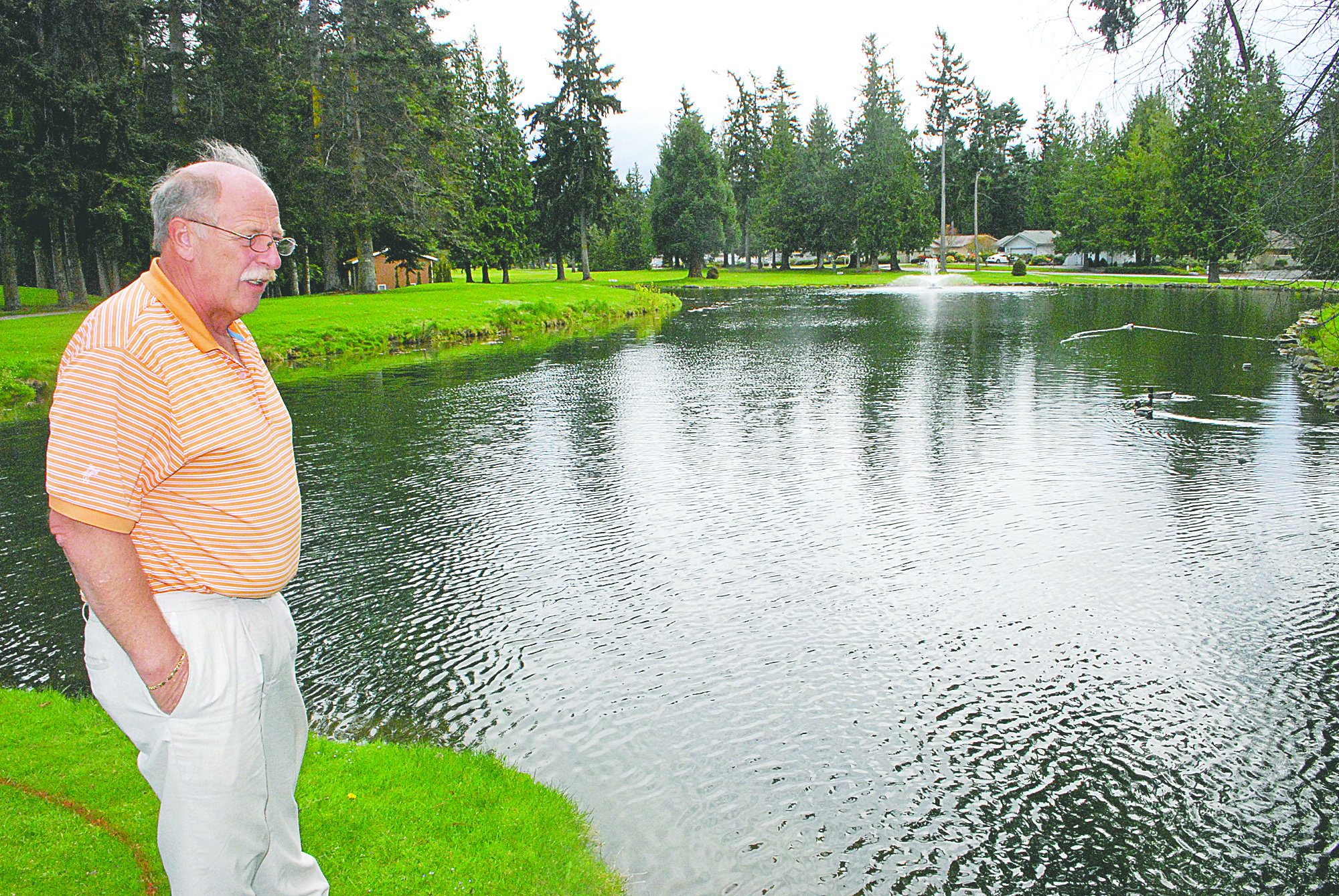SEQUIM — The plush fairways, towering cedars, placid duck ponds and well-manicured greens still attract golfers nearly three years after a proposed $300 annual homeowners fee to support marketing and maintenance of the SunLand Golf & Country Club was shot down.
The 18-hole course, which in 2009 was opened to the public on weekends, operates independently from the homeowners’ association, and weaves through the elegant retirement subdivision of some 850 homes and condominiums 2 miles north of Sequim.
Those who oversee it say times are still tough in a down economy that has contributed to golfing’s decline everywhere.
But it is nothing the club’s 185-plus members can’t survive, golf course board members said.
“What’s troubling us is our lack of new members,” said the club’s board president, Bill Engle, a SunLand homeowner and golf lover who is also a home-based salesman for an Alaska company.
Engle, however, is optimistic. He said the club recently saw eight new members, and he expects more will sign up.
Today, the golf course is backed by a volunteer force that Engle said is critical to the course’s survival.
The volunteers — mostly golfers but including some who don’t play the game — all are bent on keeping the course’s operation alive and in the green.
They number about 20 in the winter and up to 40 in spring and summer.
Maintenance and operation of the 6,200-yard, 112-acre course is done on a shoestring budget of $1 million annually, Engle said. That’s down about $200,000 from two years ago, he added.
“If we didn’t have volunteers here, we probably wouldn’t have a golf course today,” Engle said.
Added the club’s business manager, Mandy Abrams, on volunteer homeowner-golfers: “We consider it contributed capital because they own part of it.”
Volunteers make up the course’s Adopt-A-Hole program, with resident golfers who offset upkeep costs by taking on ongoing maintenance projects, saving the club thousands of dollars.
A most recent example in March and this month was a team of volunteers that improved a tee box.
The group, headed by board member and greens committee Chairman Pete Wilson, leveled the tee box on the 17th hole that required sod removal, grading and leveling the box and re-sodding it.
Volunteers have performed such tasks as painting the interior and exterior of the clubhouse and remodeling it, running the bar and hanging decorative moss flower baskets around the clubhouse.
Out on the fairways, volunteers fill divots with soil and grass-seed mixes.
“There are a lot of chores around here,” said Engle, who has served on the board for three years, two years as its president.
Engle and others on the nine-member SunLand Golf & Country Club board said in hindsight, they would not have proposed the controversial $300 fee in 2009 that led the SunLand Homeowners Association board to reject it after a number of non-golfing homeowners vehemently opposed it.
Engle and SunLand Golf & Country Club General Manager Tyler Sweet said the solution has been a matter of developing volunteerism, opening the golf course to the public at large and offering discounts on green fees to attract more younger golfers.
Engle said the club is developing a marketing plan to further promote it and invite regional golfers on weekends.
Sweet said the course he oversees as top manager and former golf pro is run more like a business and community hub.
Yoga instruction and other recreational activities are available at the club’s facilities.
Sweet said the club now offers discounts for golfers 55 and younger, which bucks the tradition of offering discounts to seniors.
The club’s largest growth in revenues has been in its food and beverage business, he said.
Sweet vows to think outside the box with other recreational offerings being considered at the club.
The clubhouse’s conference room hosts such organizations as the Sequim-Dungeness Valley Chamber of Commerce, which puts on its twice-monthly luncheon meetings there.
“I think the image of the club has changed over the years,” Sweet said, with it now supporting fundraising for the Boys & Girls Clubs of the Olympic Peninsula, the Sequim Food Bank and Snap, a local nonprofit group for people with development disabilities and their families.
Abrams said nonprofit groups use the SunLand conference facilities for less cost by contributing their own volunteers.
The budget the board adopted last week includes annual revenues generated by clubhouse conferences and events rental, the pro shop and cafe.
About $500,000 covers the course and club payroll, Engle said.
The club’s goal is to generate about $615,000 in annual dues in the coming year, he added.
He said the club also pays about $40,000 a year in Clallam County taxes.
The development was the dream of Jess Taylor, a farmer whose family grew up on the land on which SunLand is built.
The golf course was designed by Vernon Macan, a renowned Canadian golf course architect, in 1963.
The first nine holes were opened for play in July 1971.
The course operated as a nine-hole facility until real estate sales justified the second nine. It became an 18-hole course in 1975.
The clubhouse was built by members in 1994, increasing the size of the pro shop, and a cafe was added along with meeting and entertainment facilities and a state-of-the-art irrigation system.
Engle and Sweet see financial challenges ahead for SunLand Golf & Country Club but say they are nothing that can’t be overcome.
“I think the future looks good,” Sweet said.
“They have built a family here.”
________
Sequim-Dungeness Valley Editor Jeff Chew can be reached at 360-681-2390 or at jeff.chew@peninsuladailynews.com.

